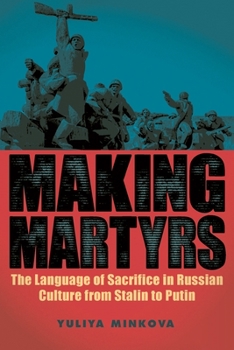Making Martyrs: The Language of Sacrifice in Russian Culture from Stalin to Putin
(Part of the Rochester Studies in East and Central Europe Series)
Examines the ideology of sacrifice in Soviet and post-Soviet culture, analyzing a range of fictional and real-life figures who became part of a pantheon of "heroes" primarily because of their victimhood. In Making Martyrs: The Language of Sacrifice in Russian Culture from Stalin to Putin, Yuliya Minkova examines the language of canonization and vilification in Soviet and post-Soviet media, official literature, and popular culture. She argues that early Soviet narratives constructed stories of national heroes and villains alike as examples of uncovering a person's "true self." The official culture used such stories to encourage heroic self-fashioningamong Soviet youth and as a means of self-policing and censure. Later Soviet narratives maintained this sacrificial imagery in order to assert the continued hold of Soviet ideology on society, while post-Soviet discourses of victimhood appeal to nationalist nostalgia. Sacrificial mythology continues to maintain a persistent hold in contemporary culture, as evidenced most recently by the Russian intelligentsia's fascination with the former oligarch Mikhail Khodorkovsky, the Russian media coverage of the war in Ukraine, laws against US adoption of Russian children and against the alleged propaganda of homosexuality aimed at minors, renewed national pride in wartime heroes, and the current usage of the words "sacred victim" in public discourse. In examining these various cases, the book traces the trajectory of sacrificial language from individual identity construction to its later function of lending personality and authority to the Soviet and post-Soviet state. Yuliya Minkova is Assistant Professor of Russian at Virginia Polytechnic Institute and State University.
Format:Hardcover
Language:English
ISBN:1580469140
ISBN13:9781580469142
Release Date:April 2018
Publisher:University of Rochester Press
Length:246 Pages
Weight:1.17 lbs.
Dimensions:0.7" x 6.0" x 9.0"
Customer Reviews
0 rating





